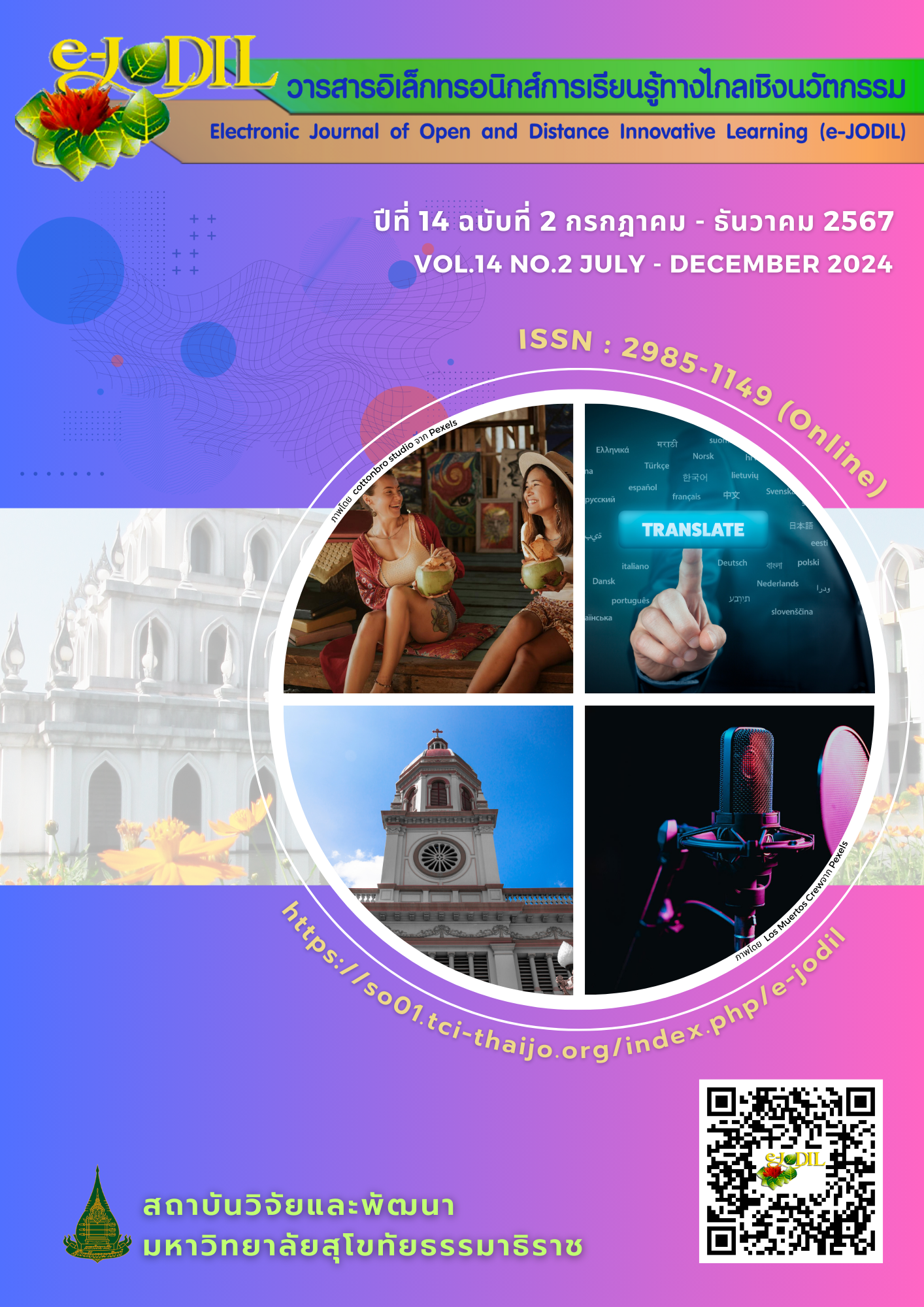พอดแคสต์เพื่อการรู้เท่าทันการแพร่ระบาดของข่าวปลอมด้านสุขภาพ ในกลุ่มเจเนอเรชั่นเบบี้บูมเมอร์
Main Article Content
บทคัดย่อ
การวิจัยเรื่องนี้มีวัตถุประสงค์เพื่อศึกษาการรู้เท่าทันการแพร่ระบาดของข่าวสารด้านสุขภาพในสื่อสังคมออนไลน์ของเบบี้บูมเมอร์ และเพื่อพัฒนาพอดแคสต์การรู้เท่าทันการแพร่ระบาดของข่าวสารด้านสุขภาพในสื่อสังคมออนไลน์ โดยทำการวิจัยเชิงคุณภาพด้วยการสัมภาษณ์เชิงลึกกับกลุ่มผู้ให้ข้อมูลหลัก ซึ่งเป็นกลุ่มเบบี้บูมเมอร์ที่มาอายุระหว่าง 56-74 ปี จำนวน 12 คน ที่เปิดรับข่าวสารจากสื่อสังคมออนไลน์เป็นประจำ จากนั้นสัมภาษณ์เชิงลึกกับนักวิชาการในสถาบันอุดมศึกษาที่มีประสบการณ์การสอนด้านสื่อสารมวลไม่น้อยกว่า 5 ปี จำนวน 9 คน โดยใช้วิธีการเลือกกลุ่มผู้ให้ข้อมูลหลักแบบเจาะจง เพื่อหาแนวทางในการพัฒนาการรู้เท่าทันข้อมูลด้านสุขภาพในสื่อสังคมออนไลน์ แล้วนำผลการวิจัยไปพัฒนาเป็นพอดแคสต์ ให้ความรู้ด้านการรู้เท่าทันข่าวสารด้านสุขภาพ
ผลการวิจัย พบว่า กลุ่มเบบี้บูมเมอร์มีพฤติกรรมการเปิดรับสื่อสังคมออนไลน์เป็นประจำ โดยเปิดรับ Line, Facebook และ YouTube เป็นหลัก เนื่องจากเนื้อหามีความหลากหลาย ง่ายต่อการเปิดรับ และสามารถเลือกเปิดรับในประเด็นที่ตนเองสนใจ โดยเฉพาะเนื้อหาเกี่ยวกับสุขภาพ เพื่อนำข้อมูลที่ได้มาปรับใช้ให้เหมาะสม ในประเด็นการรู้เท่าทันการแพร่ระบาดของข่าวปลอมด้านสุขภาพในสื่อสังคมออนไลน์ พบว่า กลุ่มเบบี้บูมเมอร์มีทักษะการเปิดรับ และการวิเคราะห์ข่าวสารด้านสุขภาพ โดยไม่เชื่อข้อมูลข่าวสารที่ได้รับในทันที ต้องมีการหาข้อมูลจากแหล่งข้อมูลอื่นมาสนับสนุน นอกจากนี้ยังมีการแสดงออกในสื่อสังคมออนไลน์ ทั้งการกดไลก์ การแชร์ข้อมูลข่าวสารไปยังเพื่อน หรือคนรู้จัก แต่ก่อนการแชร์ต่อข้อมูลจะต้องมั่นใจว่า ข้อมูลที่แชร์ต่อเป็นข้อมูลที่เป็นความจริง แต่ทั้งนี้กลับพบว่า ก่อนทำการแชร์ต่อไม่ได้อ่านข้อความทั้งหมด โดยอ่านเพียงหัวข้อ หรือพาดหัวเท่านั้น
ในประเด็นการสร้างเนื้อหาเกี่ยวกับข้อมูลสุขภาพหรือแม้แต่ข่าวปลอมด้านสุขภาพ จะมีการแชร์ต่อไปโดยมั่นใจว่าตนเองมีความรู้และมีเจตนาเพื่อบอกกล่าวสิ่งที่ดีไปยังคนใกล้ชิดหรือครอบครัว แต่ไม่มีการบอกต่อไปยังบุคคลอื่นที่ไม่รู้จัก หรือกดรายงานในสื่อสังคมออนไลน์
การเปิดรับพอดแคสต์ พบว่า กลุ่มเบบี้บูมเมอร์มีการฟังพอดแคสต์ผ่านยูทูป แต่ไม่รู้จักว่าสิ่งที่ตนเองเปิดรับฟังอยู่ เรียกว่า พอดแคสต์ ในส่วนของการผลิตพอดแคสต์ พบว่า ชื่อตอน ความยาวต่อตอน ภาพกราฟิก มีส่วนในการดึงดูดให้เลือกฟังพอดแคสต์ โดยความยาวต่อตอนที่เหมาะสม ควรอยู่ที่ประมาณ 5-20 นาทีเท่านั้น แต่สามารถแบ่งแยกย่อยเป็นตอนต่อไปได้ ส่วนรูปแบบการจัดรายการที่สามารถดึงดูดความสนใจได้ คือการจัดรายการแบบสนทนา โดยมีผู้จัดรายการตั้งแต่ 2 คนขึ้นไป ผู้วิจัยได้นำผลการวิจัยไปพัฒนาเป็นพอดแคสต์แล้วนำไปให้กลุ่มเบบี้บูมเมอร์เปิดรับ พบว่า ควรมีการปรับบทโดยลดคำซ้ำ ปรับน้ำเสียงผู้จัดรายการให้เป็นธรรมชาติ และลดเสียงดนตรีประกอบให้เบาลง ในส่วนของกราฟิกควรปรับตัวอักษรให้ใหญ่ขึ้น โดยผู้วิจัยได้นำข้อเสนอแนะไปแก้ไขพอดแคสต์ให้มีความสมบูรณ์ และนำไปเผยแพร่ในยูทูปซึ่งเป็นช่องทางหลักที่กลุ่มเบบี้บูมเมอร์ใช้รับฟังพอดแคสต์
Downloads
Article Details

อนุญาตภายใต้เงื่อนไข Creative Commons Attribution-NonCommercial-NoDerivatives 4.0 International License.
บทความ ข้อความ ภาพประกอบ ตารางประกอบ ที่ตีพิมพ์ในวารสารเป็นความคิดเห็นและความรับผิดชอบของผู้เขียนแต่เพียงผู้เดียว ไม่เกี่ยวข้องกับมหาวิทยาลัยสุโขทัยธรรมาธิราชแต่อย่างใด
บทความที่เสนอพิจารณาในวารสาร e-JODIL ต้องเป็นบทความที่ไม่เคยส่งไปลงพิมพ์ เผยแพร่ หรืออยู่ระหว่างการพิจารณาของวารสารอื่น
กองบรรณาธิการขอสงวนสิทธิ์ในการพิจารณาและตัดสินการตีพิมพ์บทความในวารสาร
เอกสารอ้างอิง
Bangkokbiznews. (2021). Change Elderly to Keep up with Digital Literacy, Don’t Fall for Fake News in the Covid Era. Retrieved from https://www.bangkokbiznews.com/social/958666.
Bangkokbiznews. (2021). 7 Things to Do for Health Products Advertising Literacy in the Covid-19 Era. Retrieved from https://www.bangkokbiznews.com/social/954794.
Brandbuffet. (2023). Update Behaviors of 6Generations in Thai Society. Retrieved May 11, 2023 form https://www.brandbuffet.in.th/2023/01/mi-group-report-6-generations-of-consumer-behaviour-in-2023/.
Chaikij, P., & Chitsawang, S. (2021). The Fake News's Infodemic about the COVID-19 Pandemicand the Preventive Measures in Thailand. Rajapark Journal, 15(40), 15-32.
ETDA. (2020). Thailand Internet User Behavior 2020. Retrieved from https://www.etda.or.th/th/Useful-Resource/publications/Thailand-Internet-User-Behavior-2020.aspx.
ETDA. (2022). Thailand Internet User Behavior 2022. Retrieved from https://www.etda.or.th/getattachment/78750426-4a58-4c36-85d3-d1c11c3db1f3/IUB-65-Final.pdf.aspx.
Euamornvanich, P. (2021). Covid-19 Social Media Infodemic Literacy. Journal of BSRU-Research and Development Institute, 6(2), 29-36.
Hobbs, R. (2010). Digital and Media Literacy: A Plan of Action. Communications and Society Program, The Aspen Institute.
Livingstone, S. (2004). Media Literacy and the Challenge of New Information and Communication Technologies. The Communication Review. 1(7), 3-14.
Makesrithongkum, B. (2011). Media Literacy: Keeping Pace with Information Age. Executive Journal, 31(3), 117-123.
Marketingoops. (2021). Know it in Advance!!! Summary of Insight for Every ‘Generation’ and ‘Consumer Behavior’ Trend of 2021. Retrieved from https://www.marketingoops.com/reports/insight-and-customer-trends-2021/.
Mookdasangsawang, C. (2021). Behaviors and Gratisfaction in Using TikTok Application of Elderly (Master’s thesis). Mahidol University. Bangkok.
Noppawong, C. (1999). Information Monitoring, Communication, and Work Satisfaction During Business Restructuring of the Siam Cement Group (Master’s thesis). Chulalongkorn University. Bangkok.
O’Neill, B., & Barnes, C. (2008). Media Literacy and the Public Sphere: A Contextual Study for Public Media Literacy Promotion in Ireland. Dublin, Ireland: Dublin Institute of Technology, Centre for Social and Educational Research.
Pantim, N., & Sampattavanich, P. (2020). Factors Affecting Baby Boomers’ Facebook Adoption and Adoption Level. Journal of Communication Arts Review, 24(1), 164-175.
Prasit, K. (2020). Media Exposure Service Innovation Base on Application and Application Behavior in Lifestyle of Baby Boomer in Bangkok Metropolitan. (Master’s thesis). Silpakorn University. Bangkok.
Priyakorn, A. (2017). The Creation Process Study of the Broadcast Programming via Podcast Channel in Thailand (Master’s thesis). School of Communication Arts and Management Innovation, National Institute of Development Administration. Bangkok.
Ramasoota, P., & Tongnok, T. (2020). The Fifth Estate: from Media Watchdogs in Civil Society to Online Citizens. Bangkok: Kobfai Publishing.
Rattanasimakul, K., Pakdeemualchon, A., & Tothanayanon, K. (2021). Fake News Literacy in Social Media Among Teenagers age and Seniors in Chiang Rai Province. Journal of Mass Communication, 9(2), 28-59.
Rawinit, W. (2020). Infodemic in Covid-19 Situation. Retrieved from https://www2.rsu.ac.th/sarnrangsit-online-detail/CommArts-Article04.
Rojanasoton, S. (2020). Get to Know Podcast, Media that can Reach the Target Group with Quality. Retrieved from https://www.thumbsup.in.th/podcast-brand-advertising.
Saengchumnong, A. (2022). Distinguish between Real News and Fake News and the Emergence of Operational Awareness Base on News Among Undergraduate Students. Thai Media Fund Journal, 1(1), 54-79.
Supsinwiwat, R. (2022). The Communication Process and Qualifications of Podcast Hosts. Institute of Culture and Arts Journal, 23(2), 55-70.
Tansuwannond, C. (2018). Media Literacy (2nd ed.). Bangkok: Suan Dusit Graphic Site.
The Modernist. (2023). Podcast, an Interesting Tool for Creating a Memorable Brand. Retrieved from https://themodernist.in.th/podcasts-an-interesting-tool-for-creating-a-memorable-brand/.


